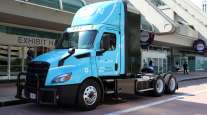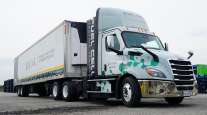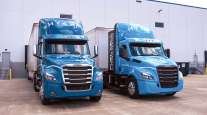Staff Reporter
Startups Seek Customers, Funds to Advance Class 8 Ambitions
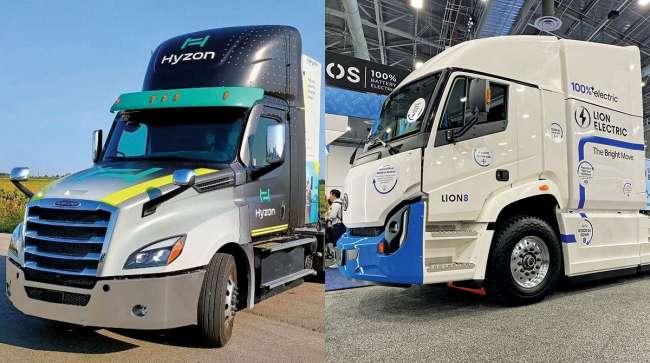
[Stay on top of transportation news: Get TTNews in your inbox.]
Startups require access to considerable funding on the road to launching manufacturing, and even more to remain afloat once production lines commence operations — a truism especially apt for manufacturers of alternative-power trucks in 2024.
Original equipment manufacturers with ambitions for their Class 8 battery-electric or hydrogen fuel cell electric trucks found last year an especially rocky road, as even the companies racking up customer wins faced dwindling cash piles in urgent need of replenishment.
The final month of 2024, for instance, saw battery-electric truck and bus maker Lion Electric file for bankruptcy protection while hydrogen fuel cell electric truck manufacturer Hyzon said layoffs were inevitable, and the company would likely fold, without a substantial injection of additional funds or a new deep-pocketed owner.
Bolingbrook, Ill.-based Hyzon issued Worker Adjustment and Retraining Notification Act notices to employees in Illinois and Michigan on Dec. 20, providing the 60 days’ notice to staff required by federal law.

The company began warning in June that layoffs in the U.S. and a new owner were a possibility and that more funds were needed even as the start of serial production of its Class 8 approached.
Hyzon said an inability to raise further funding and future uncertainty relating to the availability of government subsidies, particularly the California Hybrid and Zero-Emission Truck and Bus Voucher Incentive Project, led to the WARN notifications, prospect of employees losing their jobs and the possibility of the company shutting its doors.
The availability of the subsidies caused some customers to slow down or suspend their purchasing decisions, Hyzon said.
Montreal-based Lion — which built trucks and buses in the U.S. and Canada — said Dec. 19 that it would seek creditor protection under the Companies’ Creditors Arrangement Act, Canada’s version of U.S. Chapter 11 bankruptcy proceedings.

The sale of Lion’s innovation center in Mirabel, Quebec, to Aeroport de Montreal (ADM) for C$50 million ($35.3 million) was not enough to meet the company’s short-term liquidity needs.
Nor were serial rounds of layoffs. On Dec. 1, Lion laid off 400 staff and halted production at its Joliet, Ill., bus manufacturing plant. In April, Lion parted with 120 predominantly Canadian employees who worked in overhead and product development. In February around 100 staff were let go, most of them part of the night shift at its Saint-Jerome manufacturing facility.
Lion still had 300 employees on the payroll at the time of the bankruptcy filing.
The picture had been much sunnier earlier in 2024. At May’s Advanced Clean Transportation Expo in Las Vegas, Lion unveiled the Lion8 Tractor, a Class 8 semi featuring a 6x4 axle configuration. The Lion8 was set to join a lineup comprising two battery-electric school buses — the LionC and LionD — alongside the Lion5 and Lion6 medium-duty trucks.
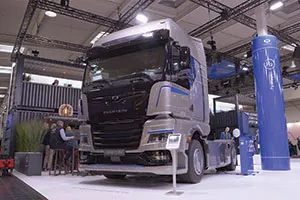
A Quantron hydrogen fuel cell electric truck on display at a trade show in Germany. (Quantron)
German heavy-duty hydrogen fuel cell electric truck maker Quantron in late October likewise sought court protection and help with its finances. Quantron, which had ambitions to launch in the U.S. and only weeks earlier unveiled a truck with a range of up to 1,500 kilometers (about 930 miles), aims to continue to operate as a business but has entered preliminary insolvency proceedings.
German insolvency proceedings are akin to Chapter 11 bankruptcy in the U.S., according to sources, so the prospects for the patient’s recovery are cloudy but not terminal.
That contrasts with U.K.-based hybrid battery-electric and hydrogen truck manufacturer Tevva, which called in the administrators in June and whose plant, machinery and stock were being sold off by August, documents show.
Tevva, which employed corporate restructuring specialist ReSolve in both 2020 and 2023 to bolster its finances, received interest from two potential buyers, but neither rescue deal came to fruition.
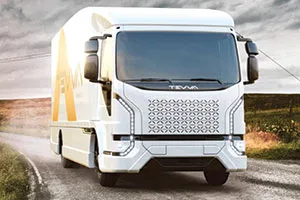
A 7.5-ton Tevva hydroelectric truck. (Tevva)
Less than 12 months before Tevva’s demise, the company told Transport Topics of plans to build a Class 8 truck in Mesa, Ariz., beginning in 2027.
The wherewithal to produce alternative-power trucks without deep enough pockets to weather the early days of introduction to the marketplace can be tough, even for segment leaders.
Hydrogen fuel cell electric truck maker Nikola reduced staffing levels in October, seeking to control costs. Layoffs also occurred in June 2023 and November 2022.
Nikola closed out the year trying to raise funding, warning that the enterprise may not escape the first quarter of 2025 without doing so.
“We estimate that our existing cash is sufficient to fund our forecast operating costs and meet our obligations into but not beyond [the first quarter of] 2025,” Chief Financial Officer Tom Okray told analysts during the company’s third-quarter 2024 earnings call. “We are examining every opportunity to optimize cash.”

Girsky
That may include partnerships, CEO Steve Girsky said during the Oct. 31 call. “We are actively talking to lots of potential different partners who value what we do and value what we’ve built,” Girsky said.
A spokesman in December said the hunt for funding was ongoing.
Hyzon joined Nikola in manufacturing hydrogen fuel trucks at the end of Q3, but it, too, found a bittersweet aftertaste to the landmark.
Hyzon began series production of its 200-kilowatt Class 8 tractor Sept. 16. And on Oct. 8, the company began series production in Bolingbrook, Ill., of the 200-kW fuel cell system set to power its trucks. But when releasing its Q3 earnings Nov. 13, Hyzon executives said they were looking to raise more funds through the capital markets or by obtaining strategic investments.
Experts from Sailun Tires dive into strategies for managing tire expenses amid a challenging freight market. Tune in above or by going to RoadSigns.ttnews.com.
Hyzon raised $4.5 million in working capital in July but warned at the time layoffs and bankruptcy protection were possibilities. That warning came after winding down its Australian and Dutch operations.
On the flip side, Daimler Truck, the parent company of Freightliner and Western Star trucks in North America, has more ample access to financing for its alternative fuel ambitions.
German federal and state governments in November confirmed more than $235 million in funding for the truck maker to develop and build 100 fuel cell trucks before serial production of Daimler’s global Mercedes-Benz GenH2 Truck begins toward the end of the decade.
Want more news? Listen to today's daily briefing above or go here for more info
The GenH2 and Mercedes-Benz’s eActros are intended to combat a truck on track to be manufactured by a startup that survived its own cash crises during the first years of production on the way to becoming the world’s largest passenger electric vehicle maker — Tesla.
The world’s most valuable company by market capitalization expected to begin pilot and serial production by the end of 2025, and previously said production capacity for its Class 8 Semi in Reno, Nev., would be 50,000 tractors per year. Production will be fully ramped up by the end of 2026, a key executive said in October.
Tesla will be joined in targeting Class 8 battery-electric truck production in 2025 by Xos. Serial production of Xos’ HDXT tractor is scheduled to start late in 2025 at a site adjacent to its existing Tennessee step van manufacturing plant.
Xos obtained a capital infusion at the start of 2024, and cut its cash burn at the same time, but still has to face the costs associated with alternative fuel Class 8 truck production that others are reckoning with.



